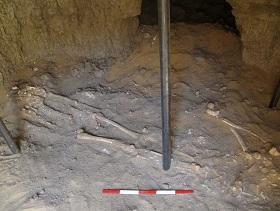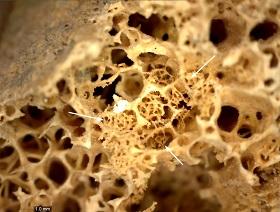Using AI to control energy for indoor agriculture
30 September 2024
Published online 30 March 2014

The discovery in Sudan of a skeleton with metastatic carcinoma challenges the notion that cancer is a modern disease and opens new horizons for specialists to research the etiology and evolution of a disease about which there is much to learn.
The cancer-ridden body of the young adult Nubian male was excavated at Amara West by Michaela Binder, a PhD student at Durham University in the UK. The vast archaeological site – 750km downstream of Khartoum in Sudan – is believed to have been founded around 1300 BC and is a research site since 2008. All human remains found there have been moved to the British Museum for further analyses by its Department of Conservation and Scientific Research.
Binder outlined the analytical methods used on the remains to determine the cause of death. "We used radiography, scanning electron microscopy and high magnification," she explained. The results of the analyses suggest that metastatic carcinoma was the most likely cause, due to the nature and characteristics of the observed changes.
The 3,000-year-old skeleton, tagged Sk244-8, is the oldest convincing complete example of metastatic cancer in the archaeological record.
Metastatic carcinoma, the most common malignancy found in bones, initially develops from a malignant soft-tissue tumour before spreading to large areas of the body. The Nubian skeleton exhibited osteolytic lesions – damage resulting from loss of calcium – in the vertebrae, ribs, sternum, clavicles, scapulae, and humeral and femoral heads.
Sk244-8 provides another important piece of evidence of cancer's longevity through history and suggests that the disease is not only a result of modern lifestyles and longer lifespans.

The grave and the settlement where the skeleton was found are being combed for clues. Binder hopes these pre-modern findings in humans may give insights into possible causes of cancer before modern living conditions prevailed.
According to Salima Ikram, head of the Egyptology Unit at the American University in Cairo, not all of our ancestors led healthier lifestyles than in the modern age. "Not all of them ate better, and many were regularly exposed to wood smoke and bitumen fumes, which are very hazardous," she said. Bitumen, an environmental carcinogen, was used by ancient Egyptians for embalming and water-proofing, and archaeological records show that people had large indoor ovens which most likely caused chronic respiratory diseases.
"Infectious diseases can also lead to cancer," explained Binder, giving the examples of Helicobacter pylori, a bacterium found in the stomach linked to the development of gastrointestinal cancer, and schistosomiasis, a parasitic disease which can cause bladder cancer and breast cancer in men.
"We are learning that cancer is a much older disease than initially thought," said Ikram. "This [knowledge] might lead to the development of new management strategies for the disease, and to the implementation of new preventive measures."
Identifying naturally occurring carcinogens is an important factor, as is finding mutations linked to cancer in ancient people. "This body is just a first step. If we analyze more individuals with cancer, we may track the evolution of changes. We could possibly see if and how the human genome changed and what factors made us susceptible to cancer," Binder said.
These analyses, complemented by sound historical background knowledge, could help researchers predict developments in the future.
doi:10.1038/nmiddleeast.2014.78
Stay connected: